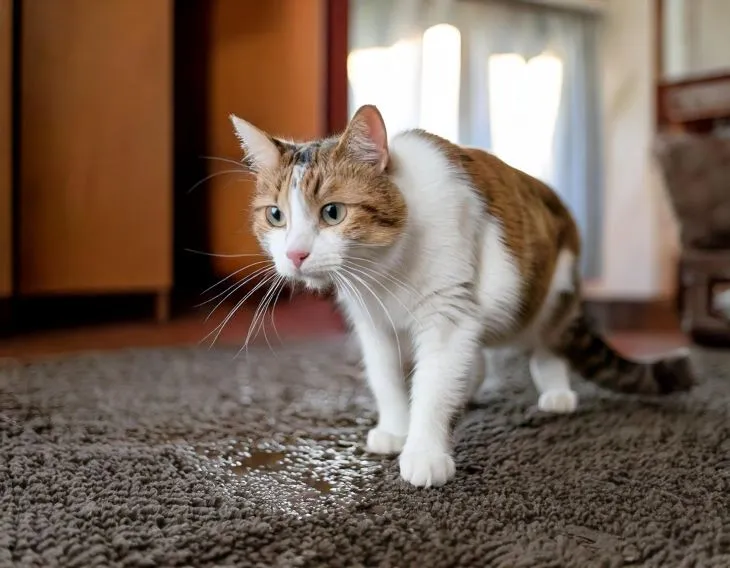How To Stop Cats From Peeing On Carpet – Common Triggers And Practical Solutions
By: Elizabeth Rikas

The information in this article is intended to educate cat parents and is not a substitute for veterinary guidance. In case of any concerns about your cat’s health, please talk with your veterinarian.
Cats peeing on the carpet can be a frustrating and persistent issue for pet owners. Understanding the root causes and addressing them with effective strategies is essential to resolve this behavior. Whether its due to medical problems, stress, or environmental factors, this comprehensive guide will help you tackle the issue and maintain harmony in your home.
Understanding The Behavior
Why Cats Pee Outside The Litter Box
Cats are instinctively clean animals, so urinating outside their litter box often signals an issue. Common causes include changes in their environment, stress, or health problems. Pinpointing the reason is crucial to solving the problem.
Common Triggers For Carpet Urination
- Stress or Anxiety: New pets, people, or household changes.
- Unclean Litter Box: Cats prefer a clean, easily accessible litter box.
- Territorial Marking: Cats may mark territory, especially in multi-cat homes.
Behavioral vs. Medical Causes
Distinguishing between medical and behavioral causes is crucial. Behavioral issues can often be resolved with training, while medical problems require veterinary attention.
Medical Reasons Behind The Behavior
Urinary Tract Infections (UTIs)
UTIs can lead to frequent or painful urination outside the litter box. Symptoms include straining or visible discomfort. A veterinarian’s diagnosis and treatment are necessary.
Kidney Problems
Kidney disease, common in older cats, may cause increased urination and accidents.
Feline Idiopathic Cystitis (FIC)
Stress-induced cystitis is a common condition that causes bladder inflammation, leading to inappropriate urination.
Click to know: Why does my cat sleep between my legs?
Environmental Factors
Litter Box Setup
- Size & Type: Ensure the box is large enough and suits your cat’s preferences.
- Location: Place the box in a quiet, low-traffic area.
- Cleanliness: Scoop daily and change litter frequently.
Click to know: How to litter train a kitten?
Unfamiliar Scents Or Objects
New furniture or rugs may carry unfamiliar scents that trigger urination. Gradual introduction and scent-marking with familiar smells can help.
Multi-Cat Household Dynamics
Some cats urinate to mark their territory, especially in multi-pet households. Identifying and addressing this behavior helps maintain peace among your pets. Provide multiple litter boxes and ensure each cat has enough space.
Click to know: Do cats like to be petted?
Training Techniques On How To Stop Cats From Peeing On Carpet
Positive Reinforcement
Reward your cat with treats and praise when they use the litter box correctly. Consistent positive reinforcement encourages proper behavior.
Redirection Strategies
If you catch your cat about to urinate on the carpet, gently redirect them to the litter box. Over time, this establishes positive associations.
Teaching Litter Box Consistency
After meals or naps, place your cat near the litter box to build a routine. Consistency is key to long-term success.
Click to know: Cat Diarrhea: Causes, Symptoms & Treatment?
Cleaning Tips To Prevent Repetition
Removing Urine Odor
Lingering smells can encourage repeat accidents. Use enzymatic cleaners designed to neutralize uric acid. Avoid ammonia-based products as they mimic urine smells.
DIY Cleaning Solutions
- Vinegar and Baking Soda: Mix vinegar with water to clean the spot, then sprinkle baking soda to neutralize odors.
- Hydrogen Peroxide: Apply sparingly on light-colored carpets to break down stains.
Hidden Stains
Use a UV flashlight to identify and clean hidden urine spots to prevent recurrence.
Interesting Read: Why Do Cats Wag Their Tails?
Behavioral Modification
Identifying Stress Triggers
Monitor your cat for signs of stress, such as hiding or over-grooming. Common triggers include new pets, loud noises, or changes in routine.
Calming Aids
Products that mimic feline facial pheromones, create a calming effect. Place these diffusers in areas where your cat spends the most time to reduce anxiety and encourage positive behavior.
- Pheromone Diffusers: Products that mimic feline facial pheromones, create a calming effect.
- Natural Remedies: Calming treats or sprays may be beneficial.
Professional Help
For severe cases, consult your veterinarian about anxiety medications or behavioral therapy.
Choosing The Right Litter Box
Types Of Litter Boxes
Experiment with open, covered, or self-cleaning boxes to find what your cat prefers.
Litter Preferences
Most cats prefer unscented, fine-grain litter. Transition gradually if changing types to avoid resistance.
Number Of Litter Boxes
The rule of thumb is one box per cat plus one extra. This minimizes competition and ensures accessibility.
Litter Box Placement
Location matters! Cats prefer quiet, low-traffic areas for their litter box. Avoid placing it near noisy appliances or their feeding station.
Blocking Access To Problem Areas
Use baby gates, closed doors, or furniture placement to restrict your cat’s access to areas where they’ve previously urinated.
Home Adjustments
Blocking Access To Problem Areas
Use baby gates, furniture placement, or closed doors to restrict access to previously soiled areas.
Cat-Friendly Environment
Provide enrichment with scratching posts, climbing trees, and interactive toys to reduce stress and boredom.
Deterrent Mats
Place mats with textures cats dislike, such as aluminum foil or double-sided tape, to deter them from targeting specific areas.
Veterinary Interventions
When To Seek Veterinary Help
If inappropriate urination persists despite your efforts, consult a veterinarian to rule out medical issues.
Diagnostic Tests
Tests like urinalysis, blood work, or imaging may be recommended to identify underlying conditions.
Treatment Options
Medications for infections, anti-anxiety drugs, or specialized diets may be prescribed depending on the diagnosis.
Common Myths And Misconceptions
Debunking “Revenge Peeing”
Cats do not urinate out of spite. Inappropriate urination is typically stress-related or due to an unmet need.
Punishment Is Counterproductive
Punishing a cat for accidents can increase anxiety and worsen the behavior. Focus on positive training methods.
Misunderstanding Litter Preferences
Not all cats dislike scented litter, but sudden changes can cause resistance. Introduce new litter types gradually.
Preventative Measures
Regular Litter Box Maintenance
Scoop daily, replace litter weekly, and clean the box thoroughly to encourage consistent use.
Routine Veterinary Checkups
Regular health checkups can catch potential issues early, preventing behavioral problems.
Managing Stress
Maintain a stable home environment and provide ample playtime to reduce stress and promote overall well-being.
Frequently Asked Questions
Conclusion
Resolving carpet urination requires patience and a proactive approach. By addressing the root cause, maintaining a clean environment, and using positive reinforcement, you can help your cat regain proper litter box habits and restore harmony in your home.

About the Author
Elizabeth Rikas
Elizabeth is a passionate advocate for feline health and well-being, drawing from her years as a dedicated pet parent to three cats—Gypsy, Swan, and Alfred—and her invaluable experience volunteering at animal shelters. A seasoned writer with a lifelong love for cats, Elizabeth began sharing her insights in her teens and has since contributed extensively to platforms focused on feline care. Through her expertise and heartfelt dedication, she empowers pet owners with practical advice and research-backed knowledge to nurture their furry companions.
